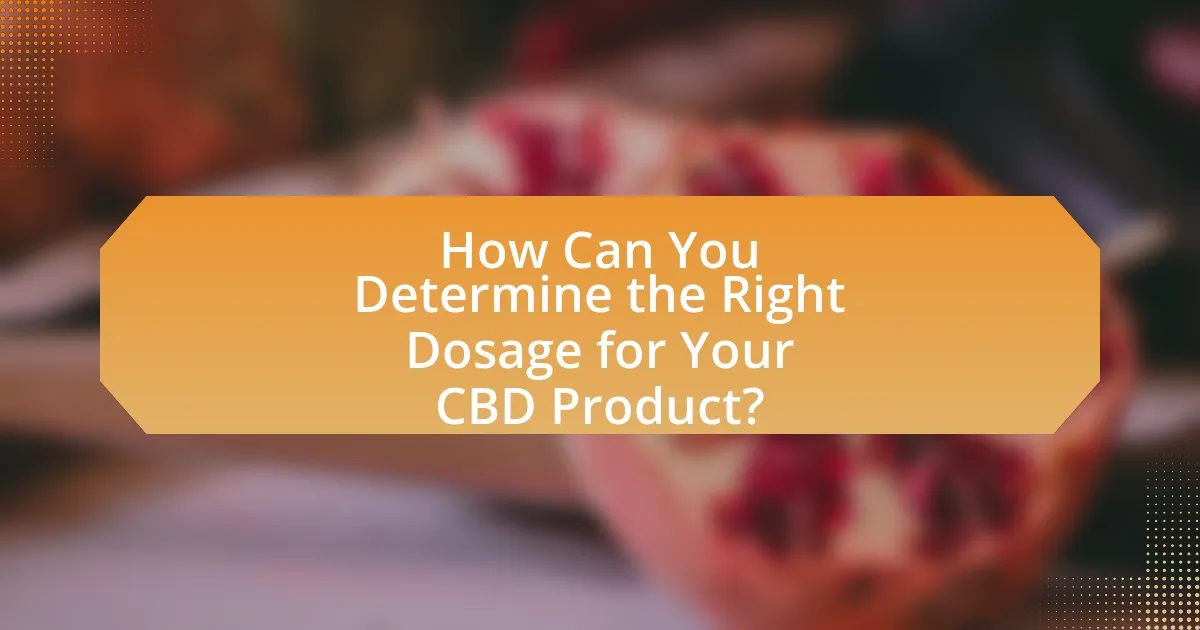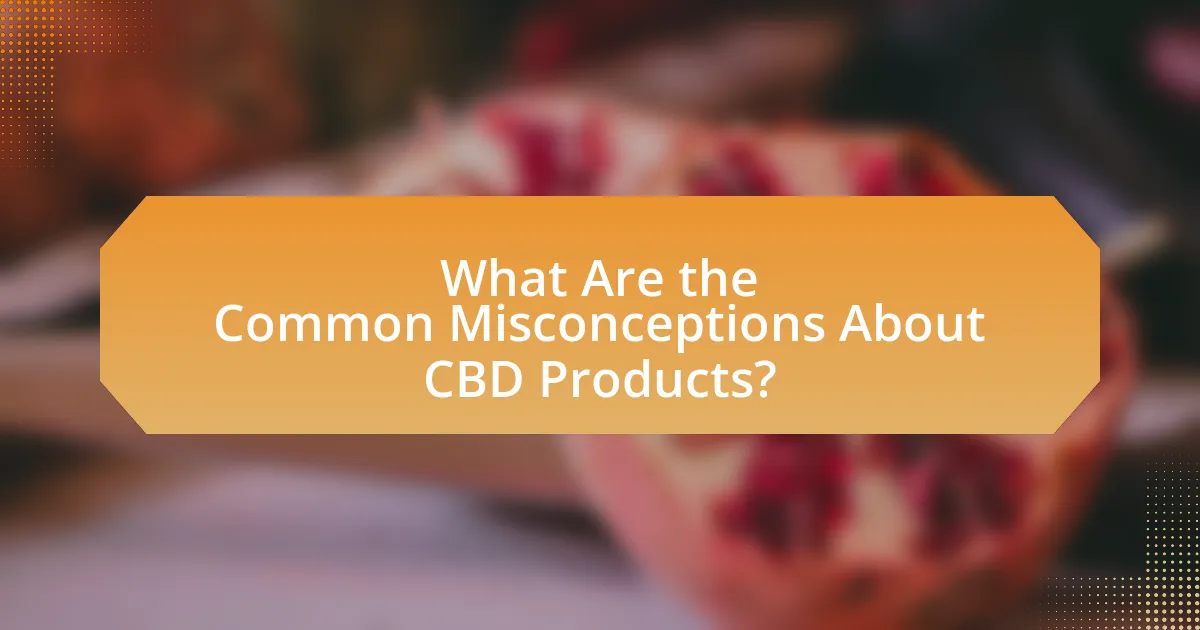Choosing the right CBD product for your lifestyle involves several critical factors, including product type, concentration, source, third-party testing, and legal compliance. Different product forms, such as oils, edibles, and topicals, cater to various needs and preferences, while understanding the concentration and source of CBD ensures safety and efficacy. Additionally, personal health goals, daily routines, and lifestyle needs play a significant role in determining the most suitable product. This article provides a comprehensive guide to navigating the complexities of CBD selection, including dosage considerations, common misconceptions, and the importance of quality and legality in CBD products.

What Factors Should You Consider When Choosing a CBD Product?
When choosing a CBD product, consider the product type, concentration, source, third-party testing, and legal compliance. The product type includes oils, edibles, topicals, or capsules, each offering different benefits and methods of consumption. Concentration refers to the amount of CBD per serving, which affects potency and dosage. The source of the CBD is crucial; products derived from hemp are generally legal and contain lower THC levels, while those from marijuana may have higher THC and different legal implications. Third-party testing ensures product quality and verifies cannabinoid content, providing transparency and safety. Lastly, legal compliance is essential to ensure that the product adheres to local laws regarding CBD and THC levels. These factors collectively guide consumers in selecting a suitable CBD product that aligns with their needs and lifestyle.
How do your lifestyle needs influence your CBD product choice?
Lifestyle needs significantly influence CBD product choice by determining the desired effects, consumption methods, and product formulations. For instance, individuals seeking relief from anxiety may prefer CBD oils or tinctures for their quick absorption and adjustable dosages, while those looking for long-lasting effects might opt for edibles or capsules. Additionally, active individuals may choose topical CBD products for targeted relief in specific areas, aligning with their fitness routines. Research indicates that user preferences are often shaped by factors such as convenience, onset time, and personal health goals, which directly impact the selection of CBD products.
What specific health goals are you aiming to achieve with CBD?
I aim to achieve specific health goals with CBD, including reducing anxiety, alleviating chronic pain, and improving sleep quality. Research indicates that CBD may effectively reduce anxiety symptoms, as demonstrated in a study published in the Journal of Psychopharmacology, which found that CBD significantly decreased anxiety in participants during public speaking tasks. Additionally, a review in the European Journal of Pain highlighted that CBD can reduce chronic pain by interacting with the endocannabinoid system. Furthermore, a study in the Journal of Clinical Psychology reported that CBD improved sleep quality in individuals with insomnia. These findings support the targeted health goals associated with CBD use.
How does your daily routine affect the type of CBD product you should select?
Your daily routine significantly influences the type of CBD product you should select. For instance, if you have a busy schedule that requires quick relief from stress or anxiety, a fast-acting product like CBD oil or vape may be more suitable, as they provide immediate effects. Conversely, if your routine includes a consistent evening wind-down, a slower-release product such as CBD edibles or capsules may be ideal, as they offer prolonged effects that can aid in relaxation and sleep. Research indicates that the method of consumption affects the onset and duration of CBD’s effects, with inhalation providing rapid relief and ingestion leading to a slower, more sustained impact. Therefore, aligning your CBD product choice with your daily activities ensures optimal benefits tailored to your lifestyle.
What types of CBD products are available on the market?
Various types of CBD products are available on the market, including oils, tinctures, capsules, edibles, topicals, and vapes. CBD oils and tinctures are liquid extracts that can be taken sublingually for quick absorption. Capsules offer a convenient way to consume a precise dosage, while edibles, such as gummies and chocolates, provide a tasty alternative. Topicals, including creams and balms, are applied directly to the skin for localized relief. Vapes allow for inhalation of CBD, providing rapid effects. The diversity of these products caters to different preferences and needs, making it easier for consumers to find suitable options for their lifestyles.
What are the differences between CBD oils, edibles, and topicals?
CBD oils, edibles, and topicals differ primarily in their method of consumption and effects. CBD oils are typically taken sublingually, allowing for quick absorption into the bloodstream, which can lead to faster effects. Edibles, such as gummies or capsules, are ingested and metabolized through the digestive system, resulting in a delayed onset of effects but potentially longer-lasting relief. Topicals, like creams or balms, are applied directly to the skin and provide localized relief without entering the bloodstream, making them ideal for targeted pain or inflammation. Each form serves different needs based on how quickly and where relief is desired.
How do full-spectrum, broad-spectrum, and isolate CBD products differ?
Full-spectrum, broad-spectrum, and isolate CBD products differ primarily in their cannabinoid content. Full-spectrum CBD contains all cannabinoids found in the cannabis plant, including THC, which can enhance the entourage effect, potentially increasing therapeutic benefits. Broad-spectrum CBD includes multiple cannabinoids but is THC-free, offering some benefits of the entourage effect without the psychoactive effects of THC. Isolate CBD consists of pure CBD with no other cannabinoids or compounds, providing a straightforward option for those seeking the effects of CBD alone without any other components. These distinctions are crucial for consumers to consider based on their preferences and desired effects.
Why is it important to consider the source and quality of CBD?
It is important to consider the source and quality of CBD because these factors directly influence the product’s safety, efficacy, and overall health benefits. High-quality CBD products are derived from organically grown hemp, which minimizes exposure to pesticides and heavy metals, ensuring a cleaner product. Research indicates that products tested by third-party laboratories for potency and purity provide consumers with reliable information about what they are consuming, reducing the risk of harmful contaminants. For instance, a study published in the Journal of the American Medical Association found that nearly 70% of CBD products sold online were mislabeled, highlighting the necessity of verifying the source and quality to ensure accurate dosing and effectiveness.
What should you look for in third-party lab testing results?
When reviewing third-party lab testing results, you should look for the presence of cannabinoid profiles, contaminants testing, and the lab’s accreditation. Cannabinoid profiles provide detailed information on the concentrations of various cannabinoids, ensuring the product contains what is claimed on the label. Contaminants testing checks for harmful substances such as heavy metals, pesticides, and solvents, which is crucial for safety. Additionally, verifying that the lab is accredited by a recognized organization, such as ISO/IEC 17025, confirms the reliability and credibility of the testing process. These factors collectively ensure that the product is both effective and safe for consumption.
How does the cultivation method impact the quality of CBD products?
The cultivation method significantly impacts the quality of CBD products by influencing the cannabinoid profile, terpene content, and overall purity. For instance, organic farming practices, which avoid synthetic pesticides and fertilizers, tend to produce hemp with higher concentrations of beneficial compounds, resulting in more effective CBD products. Research indicates that hemp grown in nutrient-rich soil and under optimal conditions yields higher levels of cannabinoids and terpenes, which enhance the therapeutic effects of CBD. Additionally, cultivation methods such as indoor versus outdoor growing can affect the environmental stressors the plants experience, further influencing the chemical composition of the final product.

How Can You Determine the Right Dosage for Your CBD Product?
To determine the right dosage for your CBD product, start by considering your body weight and the condition you aim to address. Research indicates that a common guideline is to take 1-6 mg of CBD per 10 pounds of body weight, depending on the severity of symptoms. For example, a person weighing 150 pounds may begin with a dosage of 15-30 mg of CBD. Adjustments can be made based on individual response, as factors like metabolism and the specific condition can influence effectiveness. Clinical studies, such as one published in the Journal of Pain Research, have shown that personalized dosing can lead to optimal therapeutic outcomes.
What factors influence the appropriate dosage of CBD?
The appropriate dosage of CBD is influenced by several factors including body weight, individual metabolism, the condition being treated, and the concentration of CBD in the product. Body weight affects how CBD is distributed in the body; generally, individuals with higher body weight may require a higher dosage. Individual metabolism plays a crucial role as it determines how quickly CBD is processed and eliminated from the body, impacting the effective dosage needed. The specific condition being treated also influences dosage, as different ailments may respond to varying amounts of CBD. Lastly, the concentration of CBD in the product dictates how much of the substance is delivered per dose, necessitating adjustments based on the product’s formulation.
How does your body weight affect your CBD dosage?
Body weight significantly influences CBD dosage, as individuals with higher body weight may require larger doses to achieve the desired effects. This is due to the fact that CBD is distributed throughout the body, and a larger body mass can dilute the concentration of CBD, necessitating a higher dosage for efficacy. Research indicates that a common guideline is to start with 1-6 mg of CBD per 10 pounds of body weight, adjusting based on individual response and therapeutic needs. For example, a person weighing 150 pounds might start with a dosage range of 15-90 mg of CBD.
What role does the concentration of CBD in the product play in dosage determination?
The concentration of CBD in a product directly influences the dosage determination, as higher concentrations allow for smaller doses to achieve the desired effects. For instance, a product with 1000 mg of CBD per 30 mL bottle provides a more potent option compared to a product with 300 mg in the same volume, meaning users can take less of the higher concentration product to experience similar benefits. This relationship is crucial for tailoring individual dosages based on personal needs, tolerance levels, and specific health goals, ensuring effective and efficient use of CBD.
How can you effectively monitor your response to CBD?
To effectively monitor your response to CBD, maintain a detailed journal documenting your dosage, timing, and any effects experienced. This method allows for tracking patterns and identifying what works best for your individual needs. Research indicates that self-monitoring can enhance the understanding of personal reactions to CBD, as individual responses can vary significantly due to factors such as body weight, metabolism, and the specific condition being addressed. By consistently recording this information, you can make informed adjustments to your CBD regimen, optimizing its benefits based on your documented experiences.
What signs indicate that you may need to adjust your dosage?
Signs that indicate you may need to adjust your dosage include experiencing side effects such as dizziness, fatigue, or gastrointestinal issues, which suggest that the current dosage may be too high. Additionally, if the desired effects, such as pain relief or anxiety reduction, are not achieved, it may indicate that the dosage is too low. Research shows that individual responses to CBD can vary significantly, necessitating dosage adjustments based on personal experience and tolerance levels.
How can journaling your experience with CBD help in dosage adjustments?
Journaling your experience with CBD can significantly aid in dosage adjustments by providing a detailed record of your reactions and effects over time. This practice allows you to track specific variables such as dosage, timing, and the observed benefits or side effects, enabling you to identify patterns and make informed decisions about adjustments. For instance, a study published in the Journal of Pain Research indicates that personalized dosing based on individual responses can enhance therapeutic outcomes, highlighting the importance of self-monitoring in optimizing CBD use. By maintaining a consistent journal, you can refine your dosage to achieve the desired effects while minimizing adverse reactions, ultimately leading to a more effective and tailored CBD experience.

What Are the Common Misconceptions About CBD Products?
Common misconceptions about CBD products include the belief that CBD causes psychoactive effects, that all CBD products are the same, and that CBD is a cure-all for various ailments. CBD, or cannabidiol, is non-psychoactive, meaning it does not produce the “high” associated with THC, the psychoactive compound in cannabis. Additionally, CBD products vary significantly in terms of formulation, concentration, and intended use, which can affect their efficacy and safety. Lastly, while CBD has shown promise in studies for conditions like anxiety and epilepsy, it is not a universal remedy and should not replace conventional medical treatments without professional guidance.
Why do some people believe CBD is psychoactive?
Some people believe CBD is psychoactive because it interacts with the endocannabinoid system, which plays a role in regulating mood and perception. This interaction can lead to effects that some individuals interpret as psychoactive, despite CBD not producing the same intoxicating effects as THC, the primary psychoactive compound in cannabis. Research indicates that CBD can influence neurotransmitter systems, potentially affecting anxiety and stress levels, which may contribute to the perception of psychoactivity.
What is the difference between CBD and THC in terms of effects?
CBD and THC differ significantly in their effects on the body. CBD, or cannabidiol, is non-psychoactive and is known for its potential therapeutic benefits, such as reducing anxiety, alleviating pain, and promoting relaxation without inducing a high. In contrast, THC, or tetrahydrocannabinol, is psychoactive and is primarily responsible for the euphoric high associated with cannabis use, along with effects like increased appetite and altered sensory perception. Research indicates that CBD can counteract some of the psychoactive effects of THC, making it a popular choice for those seeking relief without intoxication.
How can education help dispel myths about CBD usage?
Education can help dispel myths about CBD usage by providing accurate information and research-based evidence regarding its effects and benefits. For instance, educational programs can clarify that CBD does not produce psychoactive effects, as it is distinct from THC, the compound responsible for the “high” associated with cannabis. Studies, such as those published in the Journal of the American Medical Association, have shown that CBD can be effective in treating certain medical conditions, which counters misconceptions about its efficacy. Furthermore, education can address safety concerns by informing users about proper dosages and potential side effects, thereby fostering informed decision-making and reducing stigma associated with CBD products.
What should you know about the legality of CBD products?
The legality of CBD products primarily depends on their source and THC content. In the United States, CBD derived from hemp containing less than 0.3% THC is federally legal under the 2018 Farm Bill. However, individual states may have their own regulations, which can vary significantly. For instance, some states have legalized CBD for medical use only, while others allow recreational use. It is essential to verify local laws to ensure compliance, as violations can lead to legal consequences.
How do state laws vary regarding CBD product usage?
State laws regarding CBD product usage vary significantly across the United States, with some states fully legalizing CBD derived from hemp, while others impose strict regulations or outright bans. For instance, the 2018 Farm Bill legalized hemp-derived CBD at the federal level, but individual states have the authority to create their own laws. As a result, states like California and Colorado allow the sale and use of CBD products without significant restrictions, whereas states like Idaho and South Dakota have more stringent regulations that limit or prohibit CBD usage. This variation is influenced by factors such as local attitudes toward cannabis, public health considerations, and the economic potential of the CBD market.
What are the implications of purchasing CBD products online?
Purchasing CBD products online has several implications, including legal, safety, and quality concerns. Legally, consumers must navigate varying regulations, as CBD legality differs by state and country, impacting the availability and shipping of products. Safety is another critical implication; online purchases may expose consumers to unverified products that lack proper testing for contaminants or accurate labeling of CBD content. Quality concerns arise from the potential for misleading marketing claims, as not all online retailers adhere to stringent quality control measures. According to a study published in the Journal of the American Medical Association, nearly 70% of CBD products tested were inaccurately labeled, highlighting the importance of sourcing from reputable vendors.
What are some practical tips for integrating CBD into your lifestyle?
To integrate CBD into your lifestyle, start by determining your specific needs, such as anxiety relief or pain management. This helps in selecting the right product, whether it’s oils, capsules, or edibles. Gradually introduce CBD into your routine, beginning with a low dose and increasing as needed to find your optimal level. Consistency is key; incorporate CBD at the same time each day to establish a habit. Additionally, consider pairing CBD with other wellness practices, like meditation or exercise, to enhance its effects. Research indicates that CBD can interact with the body’s endocannabinoid system, potentially improving overall well-being when used regularly.



